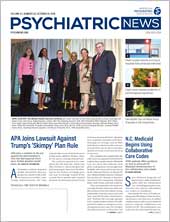A study from King’s College in London has for the first time identified how cannabidiol (CBD), a compound in cannabis, alters brain function in ways that may correlate with improvement in psychotic symptoms. The research, by psychiatrist Sagnik Bhattacharyya, M.D., Ph.D., and colleagues, was published online in JAMA Psychiatry on August 29.
Prior research has suggested that CBD may help reset brain function in people with or at high risk of psychosis, but the specific mechanisms have remained speculative (
Psychiatric News, September 15, 2017. Although the new study, which used brain imaging to observe brain activity, did not definitively link the observed changes to clinical improvement, they are consistent with known mechanisms of psychosis, according to Bhattacharyya.
“This is just a single dose,” said Bhattacharyya. “So while the findings are promising because the effects are in key brain regions linked to psychosis, in the absence of clinical correlates—that is, correlation with effects on symptoms, we can’t be sure,” he added.
The study used 33 subjects clinically at risk for psychosis, divided into a group receiving a single 600 mg dose of CBD and a group receiving placebo. The brains of another 19 healthy subjects were imaged under otherwise identical conditions without either CBD or placebo to establish a comparative baseline. Imaging of the brains of the high-risk group receiving CBD showed a dramatic change toward healthy brain function—although CBD did not fully normalize brain function.
Bhattacharyya and colleagues have received a grant for a clinical trial involving 300 patients with multiple dosing over a sustained period of time. “Within that study, we will also look at the mechanism question again, and we will really have the numbers to systematically relate the brain effects to the effects on symptoms,” Bhattacharyya said.
In contrast to current antipsychotic medications, CBD is well tolerated, said Bhattacharyya. The prospect of a relatively benign, effective antipsychotic medication is extremely encouraging, he said.
A cautionary note is that the dominant psychoactive compound in cannabis, tetrahydrocannabinol (THC), can worsen or even precipitate psychosis in at-risk individuals, Bhattacharyya commented. “While I’m very comfortable and very excited about the potential for CBD, we really need larger trials to have confidence as to its potential clinical use.”
In the meantime, it is critical that the public understand that cannabis contains many active compounds and that recreational use of cannabis should not be equated with the eventual use of a clinically approved medication.
Donald Goff, M.D., is the vice chair for research in psychiatry at New York University and author of a review article on the risks and benefits of cannabinoids and schizophrenia. He is also the recipient of the APA Research Award and Kempf Award for Mentorship in Biological Psychiatry.
“Cannabidiol is a very promising drug from which we may learn a lot about better ways to treat psychosis, but this particular study is only one piece of a very complicated puzzle,” Goff commented. “It is widely believed that it is reversing THC, which acts primarily through the CB1 receptor, but it is much more complicated than that. In fact, cannabidiol has minimal affinity for the CB1 receptor, so its mechanism is via other effects.”
CBD elevates a molecule called anandamide, which some believe is the brain’s endogenous antipsychotic, and as anandamide levels rise with CBD treatment, that tends to correlate with antipsychotic response, Goff noted. CBD, however, also acts on about 10 other receptors, all of which correlate to some extent with stress response and pathways linked to brain equilibrium. These diverse effects may stabilize the brain and, in some people, protect against psychosis, Goff said.
Britta Hahn, Ph.D., is a behavioral pharmacologist and an associate professor of psychiatry at the University of Maryland School of Medicine. Earlier this year she published an article on therapeutic potential of CBD for cannabis users with recent-onset psychosis.
Hahn echoed concerns about the public embracing the potential benefits of CBD while minimizing the risks of THC in people at risk for or diagnosed with psychosis. “THC will increase the risk of developing psychosis and also has a detrimental effect on prognosis,” she commented. Hahn would like to see research that identifies the specific receptor populations affected by CBD and how they correlate with clinical efficacy.
This study was supported by grants from the Medical Research Council of the United Kingdom. Bhattacharyya’s work was supported by the UK National Institute for Health Research Clinician Scientist Award when this work was carried out. ■
“Effect of Cannabidiol on Medial Temporal, Midbrain, and Striatal Dysfunction in People at Clinical High Risk of Psychosis: A Randomized Clinical Trial” can be acccessed
here. “The Potential of Cannabidiol Treatment for Cannabis Users With Recent-Onset Psychosis” is available
here.


